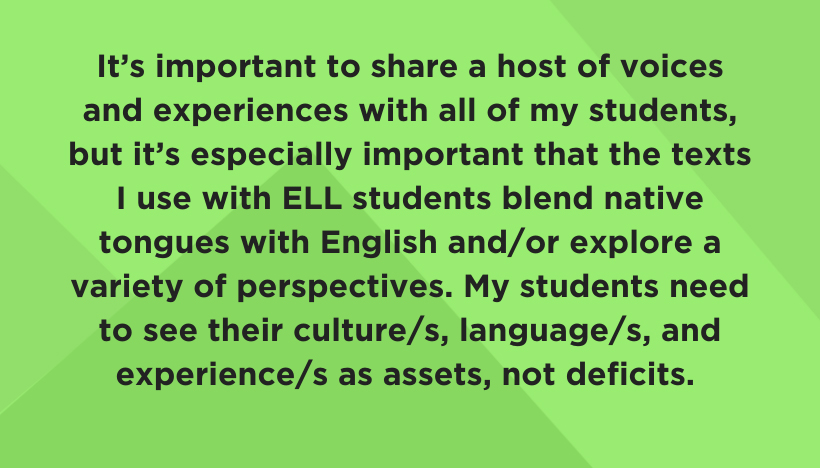This post was written by NCTE member Haley Moehlis.
An ESOL teacher and I co-teach a section of composition. We teach and learn with our English language learner students, and through this experience I’ve come to some observations that help me to facilitate their learning:
English Language Learners
Most of these students have a mouthful of languages they speak, to say nothing of dialect: Chin, French, German, Kachin, Arabic, Spanish, Dinka. Our students are English language learners. This is a critical point often overlooked.
These students are not without language, without poetry, without metaphor or imagery or idiom. They are simply learning the rules and translations in English.
Mentor Texts Reveal What the Teacher Values
All writers benefit from mentor texts, but it’s critical to explore the values we uphold in the models we choose.
I value perspective and insight, connection, emotion, and the song of sentences, so my mentor texts honor those elements. With ELL students, there’s an added layer: language. It’s important to share a host of voices and experiences with all of my students, but it’s especially important that the texts I use with ELL students blend native tongues with English and/or explore a variety of perspectives. My students need to see their culture/s, language/s, and experience/s as assets, not deficits.
When I share a mentor text, I’ll say, “I think this is good writing. Does this style/technique/word choice resonate? What did this writer do that you might try?”
Writing exists beyond the word level; it’s the message that matters. ELL students need to see themselves in the texts we read.
Here are a few of my favorites:
- “Names” (an excerpt) from Poet X by Elizabeth Aceveda
- Encyclopedia of an Ordinary Life (excerpts) by Amy Krouse Rosenthal
- “Eleven,” “Hips,” “Four Skinny Trees” from The House on Mango Street by Sandra Cisneros
- “Two Kinds” from The Joy Luck Club by Amy Tan
- “Us and Them” by David Sedaris
- “Knock Knock” by Daniel Beaty
- “Sometimes the Earth Is Cruel” by Leonard Pitts, Jr.
- “Volver, Volver” by Ariana Brown
Understanding the Obstacles
Many of my students have limited literacy skills. This year my students encountered two primary obstacles: limited word knowledge and/or limited fluency with English structures/spelling.
Limited Word Knowledge: For some, the invitation to write in their mother tongue helps remove the barrier. The chief problem is not the ability to write, but the ability to write in English. Once they unpack what they want to say in their native language, the next step is to translate it to English. Imagine trying to write a narrative with only a few hundred words in your arsenal. How would you convey your message? Most ELL students report that they do not think in English. Mentor texts (like Tan’s and Cisneros’s) normalize the complexities of bilingualism. Beginning in their strongest language bolsters them to tell their stories in English.
Limited Knowledge of English Grammar and Spelling: Google’s voice typing has been a game-changer. ELLs can more effectively express their ideas because the obstacle of typing/writing the words is removed. They focus on the message and content, rather than the surface issues that can paralyze progress.
Youliana is a perfect example. In a persuasive letter, she hoped to convince her mother to get a family dog, but an hour of focused, diligent writing produced only a single paragraph. One of her sentences read: A famlee dog will death us rspnsbltee. What she meant: A family dog will teach us responsibility.
Why did she write death when she meant teach? When Youliana speaks, d and t sound similar. She knew there was a consonant digraph at the end; she simply confused -th and -ch. Written English is complicated.
Though fluent in spoken English, Youlina lacked literacy skills. Voice typing allowed her to write two pages worth of powerful language in minutes. When she tried the technique, she was in joyful tears. She beamed, “Look how much I wrote!” For the first time, she was empowered by writing, not defeated.
Focus on the Why
When we unpack what we believe about effective writing, we can help make the process more accessible. We need to celebrate languages, not only English. Grandma doesn’t carry the same emotional weight as abuelita. Some meanings are lost in translation. Students need assurance that writing is enhanced through words not effectively translated.
Voice text can create success for writers who are impeded by limited writing skills. It allowed Youliana to demonstrate she is an effective writer: her ideas, imagery, appeals, and word choice came through clearly. We focused on grammar and spelling once she had the content.
Honor the Writer
English language learners do not arrive in our classrooms with a language deficit, they arrive with an English language deficit. They need us to honor their native languages, remove obstacles in their paths, and lean into their strengths.
In the end, our job is simple: empower our students to tell their stories and provide tools that allow them to do so.

Haley Moehlis is a high school English teacher and current president of the Iowa Council of Teachers of English. She strives to help others discover their voices and encourages them to share their writing. Her days are filled with stories, from those she and her husband share with their four young children, to the literature in the classroom, to the poetry of everyday life that unfolds around her. She is guided by Mary Oliver: “Pay attention. Be astonished. Tell about it.”
It is the policy of NCTE in all publications, including the Literacy & NCTE blog, to provide a forum for the open discussion of ideas concerning the content and the teaching of English and the language arts. Publicity accorded to any particular point of view does not imply endorsement by the Executive Committee, the Board of Directors, the staff, or the membership at large, except in announcements of policy, where such endorsement is clearly specified.

